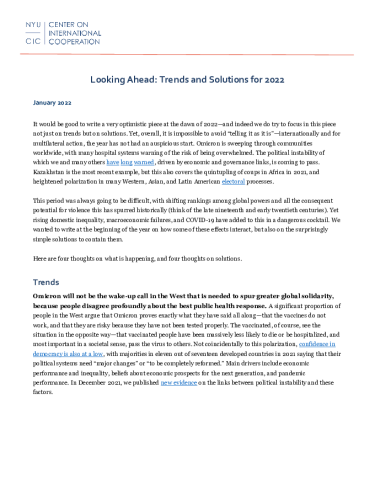It would be good to write a very optimistic piece at the dawn of 2022—and indeed we do try to focus in this piece not just on trends but on solutions. Yet, overall, it is impossible to avoid “telling it as it is”—internationally and for multilateral action, the year has not had an auspicious start. Omicron is sweeping through communities worldwide, with many hospital systems warning of the risk of being overwhelmed. The political instability of which we and many others have long warned, driven by economic and governance links, is coming to pass. Kazakhstan is the most recent example, but this also covers the quintupling of coups in Africa in 2021, and heightened polarization in many Western, Asian, and Latin American electoral processes.

This period was always going to be difficult, with shifting rankings among global powers and all the consequent potential for violence this has spurred historically (think of the late nineteenth and early twentieth centuries). Yet rising domestic inequality, macroeconomic failures, and COVID-19 have added to this in a dangerous cocktail. We wanted to write at the beginning of the year on how some of these effects interact, but also on the surprisingly simple solutions to contain them. This analysis considers four trends on what is happening, and four thoughts on solutions.
Read the full analysis: Looking Ahead: Trends and Solutions for 2022


